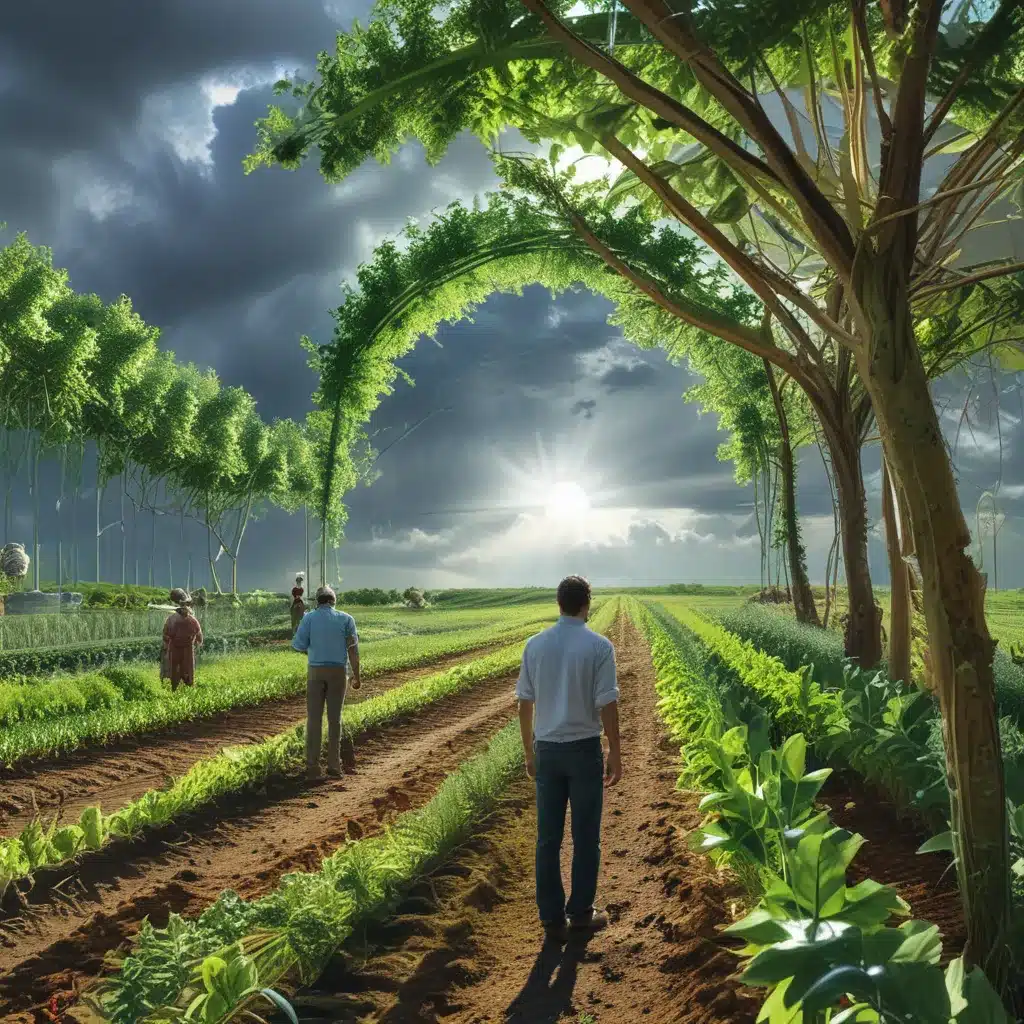
Envisioning a Future of Abundant, Equitable Food Systems
As I stroll through the lush, vibrant rows of my farm, Good Rain Farm, I can’t help but feel a sense of both pride and humility. This land, nestled in the rainy West Cascades, is not merely a patch of soil and plants – it’s a living, breathing tapestry, woven with the threads of my Indigenous heritage, my community’s resilience, and a vision for a more sustainable future.
My name is Michelle Week, and I’m a self-proclaimed “garden futurist” – a steward of the land who is driven to redefine the way we approach food systems, one heirloom crop and traditional recipe at a time. Through the community-supported agriculture (CSA) model at Good Rain Farm, I’m on a mission to decolonize diets, revitalize culture, and champion food sovereignty – all while returning to reverent, sustainable land stewardship.
Reconnecting with Ancestral Roots
The name “Good Rain Farm” was not chosen lightly. As I dove deeper into my family’s Arrow Lakes Sinixt ancestry, I stumbled upon a captivating creation story – one where Rain, the embodiment of life-giving water, falls in love with the mischievous trickster Coyote, and together they carve out the very landscape that now sustains my farm. This narrative has become the guiding principle for my work, a constant reminder of the sacred relationship between humans, nature, and the interconnected web of all living things.
As I learned more about my heritage, I felt a deep calling to honor the Pacific Northwest’s Indigenous First Foods – the staple crops and wild-harvested plants that have nourished my people for millennia. From nourishing nettles and miners’ lettuce to the iconic camas lily, these resilient perennials are not only packed with nutrients but also carry the weight of cultural significance and the stories of my ancestors.
Cultivating Food Sovereignty
But my work at Good Rain Farm extends far beyond the boundaries of my leased land. As a member of the urban Indigenous community in Portland, Oregon – a city that is home to the fifth-largest urban Native population on the West Coast – I’ve seen firsthand the challenges of accessing traditional foods and reclaiming food sovereignty.
Through my recent fellowship with the Viviane Barnett Fellowship for Food System Leaders, I’ve had the opportunity to connect with other passionate advocates and leaders, all of us striving to bridge the gap between our ancestral diets and the modern realities of life in the city. Together, we’re exploring innovative ways to bring these culturally significant crops and recipes back to our communities, whether it’s through school garden programs, community-based food hubs, or our very own CSA model.
Redefining the Relationship Between Humans and Nature
At the heart of my work lies a fundamental shift in perspective – one that challenges the deeply ingrained Western notion of separating humans from nature. As an Indigenous person, I inherently understand that we are not mere observers of the natural world, but rather integral threads in the tapestry of our ecosystems. We have a responsibility to tend to the land, to coexist in reverent reciprocity with the plants, animals, and elements that sustain us.
This philosophy manifests in the way I approach farming at Good Rain. Rather than adopting a grid-like monoculture approach, I’ve embraced a more biodiverse, intermingled layout that mimics the natural patterns of the Pacific Northwest landscape. By growing a vibrant tapestry of native perennials, heirloom crops, and traditional Indigenous foods, I’m not only nourishing my community but also supporting the intricate web of life that thrives on my farm.
Honoring the Wisdom of the Land
One of the most valuable lessons I’ve learned through my work is the importance of listening to the land itself. As Debisi Araba, a renowned research fellow at Imperial College London, has eloquently stated, “Soil health is the foundation of food security.” By tuning in to the rhythms and needs of the soil, I’ve been able to foster a thriving ecosystem that not only produces abundant, nutrient-dense crops but also supports a diverse array of pollinators, birds, and other wildlife.
This holistic approach extends beyond the boundaries of my farm. As I’ve connected with urban Indigenous communities and explored the stories behind the traditional foods I grow, I’ve come to understand that the health of our land and the well-being of our people are inextricably linked. By revitalizing these culturally significant crops and sharing their histories, I’m not only nourishing bodies but also nourishing spirits, rekindling a sense of identity and belonging that has been too long suppressed.
Cultivating a Future of Abundance and Equity
Of course, the path to realizing this vision of a more sustainable, equitable food system is not without its challenges. Access to land, particularly for marginalized communities, remains a significant barrier, and the instability of short-term leases can make it difficult to commit to long-term investments in the land.
Yet, I remain steadfast in my belief that, together, we can create a future where food is abundant, accessible, and deeply rooted in the unique cultural identities of our communities. At Thornapple CSA, we’re dedicated to supporting visionary farmers like myself, providing the resources and support needed to nurture these transformative, community-centered initiatives.
As I stand amidst the bustling life of my farm, I can’t help but feel a sense of hope. The work is arduous, the challenges are many, but the rewards are immeasurable. With each basket of heirloom produce I deliver, each story I share, and each connection I forge with my community, I’m one step closer to a future where our relationship with the land is one of reverence, reciprocity, and resilience. It’s a future where we all, regardless of our backgrounds, can come together to cultivate abundance, equity, and the deep, abiding nourishment of our shared humanity.



